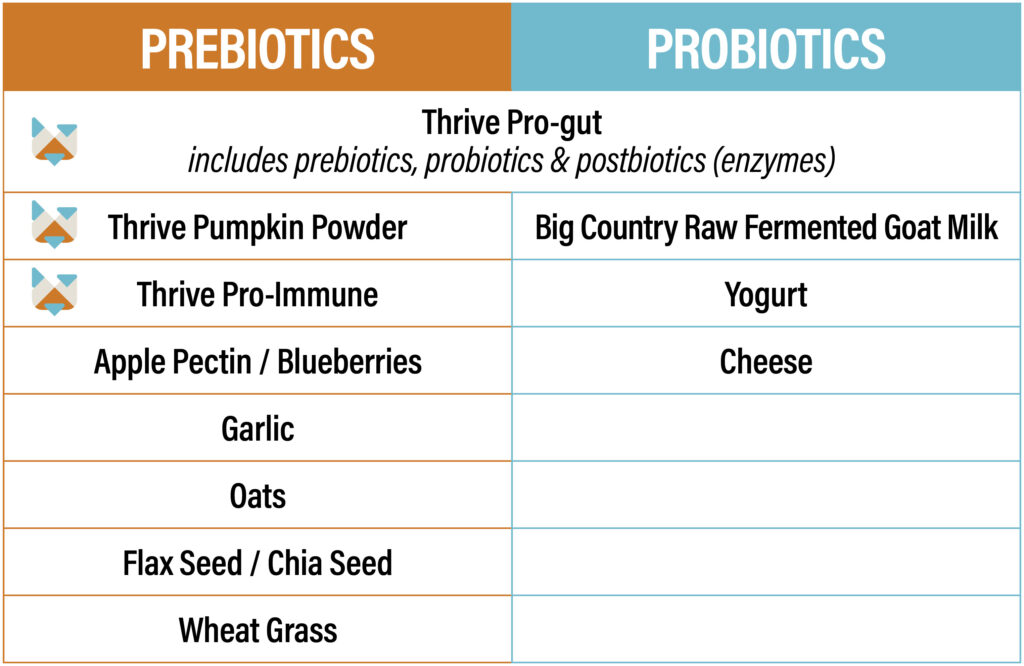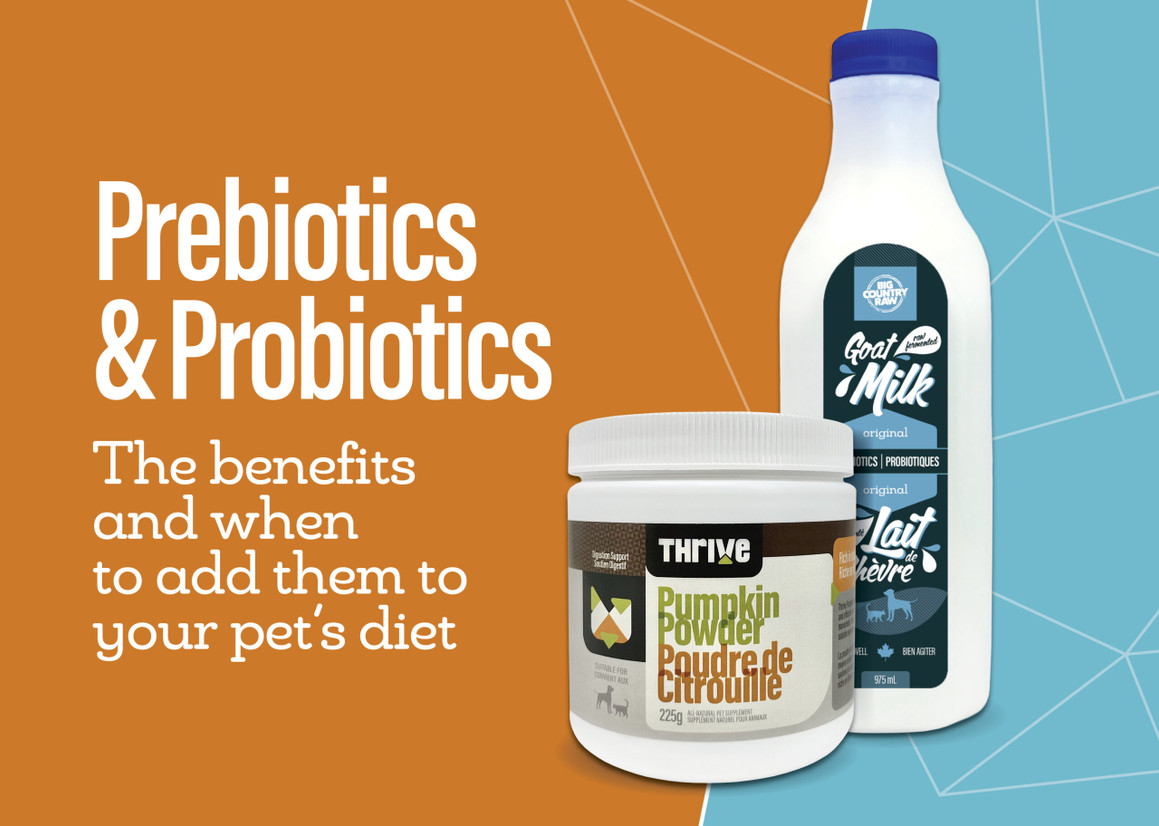Comprendre les prébiotiques et les probiotiques
Probiotiques, prébiotiques, microbiome, bactéries, autant de mots à la mode lorsqu'on parle de santé intestinale. Qu'est-ce que c'est et comment fonctionnent-ils ensemble pour garder nos animaux de compagnie en bonne santé ?
En termes simples, les prébiotiques sont une source de nourriture pour les probiotiques, les bactéries saines qui vivent dans le tractus intestinal de l'animal et qui constituent son microbiome. Il s'agit d'une symbiose délicate, d'une micro relation destinée à favoriser la santé de l'ensemble du corps, en commençant par l'intestin. Certains aliments que nos animaux de compagnie consomment chaque jour contiennent des prébiotiques et des probiotiques, mais comment savoir s'ils sont suffisants ? Quand faut-il donner des suppléments ? Doivent-ils être utilisés tous les jours ?
Prébiotiques
Les prébiotiques sont des fibres solubles non digestibles qui servent de source de nourriture à la microflore de l'intestin de votre animal. Nourrir les bonnes bactéries du tube digestif leur permet de proliférer pour faciliter la digestion des aliments, l'absorption des nutriments, la prévention des maladies et le maintien d'une bonne santé générale. L'apport d'une variété de prébiotiques permet à ces bactéries auxiliaires de se développer dans le microbiome de l'animal.
Probiotiques
Les probiotiques sont des organismes vivants sains (bactéries) qui constituent la première ligne de défense contre les bactéries nocives. Pour ce faire, ils se développent et prospèrent dans le tube digestif, ne laissant aucune place aux mauvaises bactéries pour les coloniser. Une population bactérienne diversifiée et bien peuplée est essentielle à la santé de votre animal. Les bactéries utiles qui résident dans l'intestin constituent jusqu'à 80 % du système immunitaire de l'animal. Soutenir cet épicentre de la santé est donc l'un des meilleurs moyens d'atténuer, voire de prévenir, les maladies.
En quoi les probiotiques sont-ils bénéfiques pour la santé générale de nos animaux de compagnie ?
La supplémentation en probiotiques est connue pour être bénéfique aux animaux de compagnie souffrant de.. :
- Symptômes d'allergie / intestin perméable
- Infections des voies urinaires
- Infections à levures chroniques
- Diarrhée, constipation et maladies intestinales
- Flatulences
- Mauvaise haleine
- Obésité
Lorsqu'on propose un supplément de prébiotiques et de probiotiques, l'objectif est d'améliorer l'environnement naturel de l'intestin, ce qui permet aux bactéries de l'intestin de faire plus facilement leur travail.
L'environnement de votre animal, et même la nourriture qu'il consomme, ont un impact sur son microbiome intestinal - soit en favorisant sa santé, soit en détruisant involontairement les bonnes bactéries, ce qui augmente le risque de maladie. En particulier, les aliments transformés, riches en amidon et en conservateurs, favorisent la prolifération de bactéries nocives. L'utilisation d'antibiotiques et d'autres médicaments, le contact avec des pesticides, des produits d'entretien ménager nocifs et d'autres toxines environnementales ont également un impact négatif sur la santé intestinale de votre animal et peuvent provoquer une dysbiose. La dysbiose est le processus par lequel les bonnes colonies bactériennes diminuent, permettant aux bactéries pathogènes de voler les nutriments et de créer un déséquilibre nuisible dans le microbiome de l'animal, entraînant une maladie.
Lorsque vous choisissez un supplément probiotique, il est important d'opter pour un produit qui offre de nombreuses souches bactériennes - avec les bactéries bénéfiques, plus on est de fous, plus on rit. Un microbiome sain et équilibré héberge des milliers de familles de bactéries et de microbes différents. Chaque famille bactérienne se développe mieux avec un régime alimentaire différent, d'où l'importance de proposer une variété de prébiotiques. En proposant plusieurs options de fibres saines, on s'assure que les bactéries intestinales ont de la nourriture, ce qui permet au microbiome de prospérer.
Des moyens simples pour soutenir le microbiome de votre animal de compagnie :
- Limiter l'exposition aux toxines environnementales telles que les nettoyants agressifs et tous les pesticides, herbicides et fongicides
- Adopter un régime alimentaire à base d'aliments frais adapté à l'espèce
- Donner des aliments riches en probiotiques
- Donner des prébiotiques en même temps que des probiotiques
La plupart des animaux de compagnie peuvent bénéficier d'un apport en probiotiques et en prébiotiques. Appelés collectivement synbiotiques, ils constituent un duo de choc pour la santé intestinale de votre animal, et c'est pourquoi ils doivent tous deux être présents dans les compléments alimentaires digestifs pour chiens. Le varech, la spiruline et la gomme de guar sont des prébiotiques courants que l'on trouve aux côtés des souches de Lactobacillus et de Bifidobacterium, deux familles de bactéries saines pour l'intestin qui vivent dans le microbiome de votre animal. Thrive Pro-gut est un complément synbiotique contenant à la fois des prébiotiques et plusieurs souches de chacune des bactéries intestinales bénéfiques. La supplémentation en probiotiques pourrait être la partie la plus simple de la routine de soins de votre animal, avec le plus grand bénéfice.
Si vous souhaitez ajouter des aliments complets contenant des prébiotiques et des probiotiques dans la gamelle de votre animal, essayez-les :

Thrive Pro-gut - 8 souches bactériennes et des prébiotiques ajoutés pour un bénéfice maximal pour l'intestin. Lactobacillus Acidophilus, Lactobacillus Plantarum, Lactobacillus Caseium, Lactobacillus Bulgaricus, Lactobacillus Rhamnosus, Lactobacillus Brevis, Bifidobacterium Bifidus, Bifidobacterium Longum, Saccharomyces Boulardii.
Lait de chèvre fermenté cru - contient 2 cultures bactériennes et n'est pas pasteurisé, ce qui en fait le choix idéal pour aider à soulager les troubles digestifs mineurs. Lactococ-Cus Lactis, Leuconostoc Mesenteriodesand
*Conseil - offrir les deux sources de probiotiques pour un bénéfice maximal.
Les besoins de chaque animal sont différents et un probiotique qui fonctionne pour un animal peut ne pas fonctionner pour un autre. Si l'intestin grêle d'un animal est entièrement colonisé, voire surpeuplé de bactéries, l'ajout de probiotiques aggrave généralement les symptômes digestifs. Cette condition est appelée SIBO (Small Intestine Bacteria Overgrowth) et on sait qu'elle représente jusqu'à 80 % des problèmes digestifs chroniques chez l'homme.
Il y a plusieurs cas où l'offre de probiotiques peut être particulièrement bénéfique
- Offrir des probiotiques plusieurs jours avant une activité stressante (visite chez le vétérinaire, compétition, voyage, pension)
- Offrir des probiotiques avant et pendant un traitement antibiotique prescrit par votre vétérinaire
- Pendant un changement de régime alimentaire pour faciliter la transition
- Offrir des probiotiques 2 à 3 fois par semaine pour donner un petit coup de pouce.
Il est important de noter que les probiotiques ne sont PAS des enzymes digestives. Les enzymes digestives sont des protéines qui décomposent les aliments et les rendent utilisables ou digestibles. À moins qu'un vétérinaire n'ait diagnostiqué une pancréatite ou une IMA chez votre animal, celui-ci ne doit pas recevoir régulièrement de fortes doses d'enzymes digestives.
Références :
https://www.sciencedirect.com/science/article/pii/S0195561621000127?via%3Dihub
https://www.sciencedirect.com/science/article/abs/pii/S019556162030111X?via%3Dihub
Articles récents
-
Garantir la sécurité alimentaire
Garantir la sécurité alimentaire avec Big Country Raw : De la production à votre cuisine Chez Big Country
-
Nouvelle saison, nouvel animal de compagnie
Le printemps est le moment idéal pour prendre un nouveau départ. Donnez à votre nouveau chiot ou chaton les éléments nutritifs dont il a besoin pour se sentir bien dans sa peau.
-
Morsures, os et brossage
Favoriser la santé dentaire de votre animal de compagnie, naturellement. En l'honneur du Mois de la santé dentaire des animaux de compagnie (février





